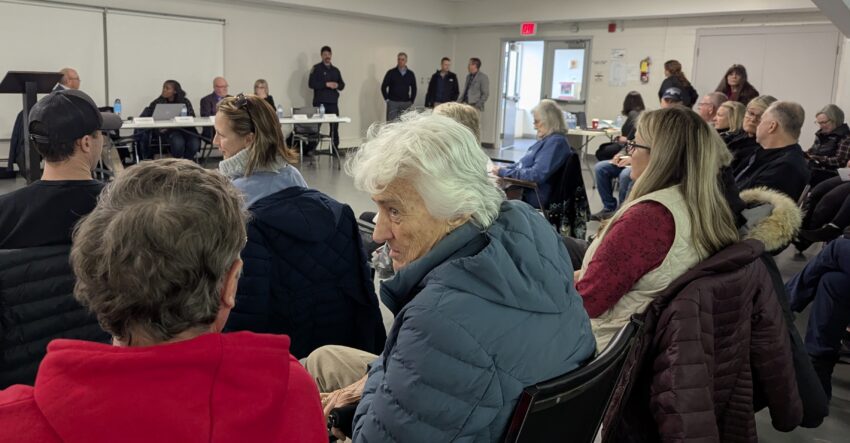Whether the 50 or so folks who attended agreed with the township’s plan to license short-term rental accommodations (STRAs) and bed-and-breakfast establishments (B&B) or not, the information session spelled out why the municipality was taking this direction, what was involved in the new process and how the new licensing regime will benefit Oro-Medonte in its fight against illegal STRAs.
Hosted by George Vadeboncoeur, the township’s manager of planning special projects, the session included presentations from a number of people involved in putting the licensing program together — Paul Dray and Karen Landry, consultants at Dray and Associates; Samantha White from Granicus Host Compliance Services and Curtis Shelswell, chief bylaw enforcement officer for Oro-Medonte.
It was stressed early on in the session that the information that was being presented represented a draft of the plan, not the final version.
According to township officials, STRAs are only permitted in two zones — the Village One zone, which is made up of the condos in the parking lot at Horseshoe Resort, and the Residential Two, exception 123 zone, which is commonly referred to as the Carriage Hills Resort and Carriage Country Club.
Vadeboncoeur explained the township’s zoning bylaw regulates the use of the land in the municipality, and if the use is not specifically detailed in the bylaw, it’s not a permitted use.
Dray, a short-term rental prosecutor for a number of municipalities, joined in the discussion to provide additional clarity.
“Zoning is the use of land, licensing regulates the activity on that land and they are two separate entities,” Dray said. “Zoning comes from the Planning Act, licensing comes from the Municipal Act.
According to Dray, the Municipal Act gives the township the authority to license activities and impose conditions on that licence.
In the case of short-term rentals, the licensing conditions that have been drafted by the township for consideration are many, including limiting the number of guests per bedroom, having a septic system that can meet the needs of the maximum number of guests, providing a minimum of one parking space per bedroom, carrying $2 million of insurance coverage and designating a responsible person who can be on site if issues arise.
The conditions have been drafted this way to ensure the township can accomplish four main objectives:
- Maintain community character and a healthy environment
- Ensure rental properties are compliant with bylaws and regulations
- Ensure rental properties are safe for occupants
- Provide staff with tools to remediate concerns.
To secure a licence, an application must be submitted to the township and it must include the property owner’s name, address and contact information, property and responsible person contact information, site map and floor plan of the property, and a renter’s code of conduct.
Breaking any of the conditions of the licence could lead to penalties — demerit points against the licence and/or monetary fees, as the township described them.
For example, exceeding maximum occupancy would result in a penalty of five demerit points. The responsible person failing to respond within the required time would be a four demerit point penalty. A violation to the Fire Protection and Prevention Act would result in a penalty of six demerit points.
Demerit points would expire after two years.
Once a property accumulates seven demerit points within a six-month period, the property owner’s licence will be suspended and will no longer be able to operate their STRA or B&B for a period of one year from the date of revocation of the licence.
Additionally, they could face monetary fees that would be added to their tax bill under the township’s recently implemented administrative monetary penalties (AMP) program, a system that applies penalties outside the court system.
In addition to controlling and policing legal STRAs, the township will be able to identify rogue operators, with help from Granicus Host Compliance Services, a third-party enforcement service.
According to White, an account executive with Granicus, the service scans more than 70 short-term rental platforms and pulls down the addresses of all advertised STRAs in the municipality. That information is checked and double-checked against three publicly available sources to confirm that each location is correct.
If an illegal STRA is found, Granicus/Oro-Medonte Township will send out a letter advising them that they’re illegal and they must cease their illegal activity.
If the letter doesn’t work, the township can exercise its right and issue a monetary fee.
The suggested fee for operating a STRA or B&B without a licence is $1,250 for the first offence, $1,750 for a second offence and $2,250 for each and every offence thereafter.
Township officials hope the monetary fees outweigh the income that’s being generated by the illegal STRA.
After receiving public feedback, township staff will prepare a summary of comments they’ve received and will draft an information report to council. They will finalize the licensing bylaw and prepare a final report to council with recommendations for council’s consideration and final decision.

